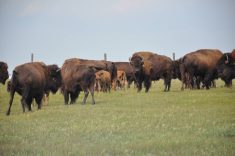Western Producer reporter Barbara Duckworth attended the Western National Stock Show and R-CALF meeting in Denver, Colorado, and filed these reports.
DENVER, Colo. Ñ Texas rancher Chuck Kiker says until the full risks of BSE are known, he wants the Canadian border closed completely.
That is a commonly held view among members of the Ranchers-Cattlemen’s Action Legal Fund.
“We’ve got a problem with BSE and we are about to open the Canadian border,” he said at the R-CALF annual meeting in Denver Jan. 20-21.
Read Also

Trump’s tariffs take their toll on U.S. producers
U.S. farmers say Trump’s tariffs have been devastating for growers in that country.
He told U.S. agriculture undersecretary Bill Hawks to use his influence with new agriculture secretary Mike Johanns to address the problem now because there is an uprising in the American countryside over the March 7 border opening.
“We would like for you to sit down with that gentleman and ask him to immediately close the border to all imported beef and cattle,” said Kiker, who received a noisy, standing ovation.
In an interview, Kiker said he personally believes the BSE issue has been overblown.
“The whole deal is scary in respect to the public perception, but I do know it is very hard to get CJD,” he said in reference to Creutzfeld Jakob disease, the human form of the brain wasting condition.
Yet he worries about potential health risks to livestock and possible economic calamity blindsiding American producers in the same way Canadians were stricken.
“I have no animosity against Canada. We could find three cases tomorrow and I would say we need to test a whole bunch more in the U.S. and figure out how we got in this position,” he said.
The U.S. Department of Agriculture should require Canada to do a study over a three or six month period and test all cattle to assess the level of disease in the herd.
“If none turn up, then maybe we step back and say OK, maybe they don’t have as bad a problem as we thought,” he said.
Kiker also said trade should not resume with Canada until the U.S. has regained lost markets in Asia.
“What’s sad about this whole thing is, it is pitting two countries against each other that if we could just address it, everybody would be better off in the long run.”
Kiker’s opinions were not unique at the R-CALF meeting. Some ranchers suggested the USDA should pressure Canada to test more and enforce its feed ban. Many at the meeting charged the Canadian feed ban has failed, as suggested by reports that animal protein was found in grain-based rations.
Bill Bullard, chief executive officer of R-CALF, said his government erred by relying on the Harvard Centre for Risk Analysis study of the American situation and its ability to keep BSE out of the country. USDA quotes the Harvard work as a justification to resume trade but R-CALF said the study is irrelevant because it was based on the assumption of no BSE in either country.
R-CALF has been trying to prevent the introduction of BSE to the U.S. by winning a court injunction to stop an expanded list of Canadian beef products and filing a complaint Jan. 10 to keep the border closed.
“We recognized this was perhaps the most significant threat facing this industry for decades and we recognized the United States Department of Agriculture was not necessarily concerned with the interests of the cattleman,” Bullard said.
If the Americans should discover a homegrown case and hurt consumer confidence, losses could halve the $45 billion U.S. beef industry, said John van Sickle, agricultural economist from the University of Florida.
The Americans have lost nearly $2 billion worth of export markets since a BSE case was found in Washington state in December 2003. The infected cow was traced to Alberta.
U.S. exports dropped from 10 percent of its production to less than two percent with most of the meat going to Canada and Mexico. Product had to be diverted to domestic market yet the U.S. continued to import beef.















